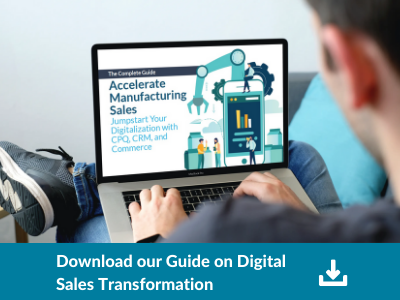Emotions are not commonly used in B2B manufacturing sales. You would think that your customers are rational people, driven to select only the screw that fits or the switch that flips. However, you would only be partially correct. A 2019 study by The B2B Institute at LinkedIn showed that emotional B2B marketing strategies consistently outperform the ones that appeal to logic.
Does that mean manufacturing sales reps have to hold back on spec sheets and brochures? Not necessarily. The rational messages that you have been using are still important, but emotions can play a significant role in helping you put the foot in the door or seal the deal.
However, using emotions to sell is not as simple as making your prospect cry or laugh. It takes a little bit of psychological understanding to use it effectively. Here, we have 7 of the strongest emotions which can help steer a deal in your favor, meet your targets, or simply connect with your customers better.
Table of Contents:
Emotional triggers
.jpg?width=1200&name=7%20emotional%20triggers%20that%20help%20you%20hit%20manufacturing%20sales%20targets%20%20(1).jpg)
Using emotions in your sales pitches can be an effective way to sell. However, it also needs to be supported by a seamless buying process, or your customer may disengage before they commit. Find out how you can digitalize your B2B manufacturing sales process with our guide on how to "Accelerate Manufacturing Sales."
1. Fear
Fear is a powerful motivator. In business, fear drives decisions that can protect the company. Some examples of fear are:
- Fear of losing to the competition
- Fear of low return on investments
- Fear of business disruption
By understanding what their customers fear, sales reps can better shape their story. You want to highlight a problem while presenting your business as the solution that is ready to help.
For example, if your company provides custom screws, you could highlight low steel prices that help increase savings if they decided quickly.
After that, logic takes over, and the customer spends less time shopping for a screw supplier. And eventually settles with your screw manufacturing business.
Some B2C examples of selling through fear are limited-edition sneakers, limited-time sales, and minimum-amount free shipping.
A caveat with fear-based selling, however, is that sales reps need to tread very carefully. The first thing to realize is that you’re not trying to scare your customers. They have had enough of it and would actively shut out more sources of fear.
Unethical use of this emotional trigger can irreversibly harm the business in terms of reputation. Customers who have a negative experience are less likely to come back.

2. Trust
Today, trust (53%) is the second most important factor after price (64%) for people of all age groups. Like we mentioned earlier, fear is a powerful motivator. And everyone, whether consumers or B2B buyers fears something—which makes trust a powerful emotion to fuel sales.
According to psychologist Robert Plutchik, trust, when combined with joy, equates to love. That means when your customers trust you and are happy with your services, they will love working with your business.
However, earning your customers’ trust will not be easy. Your customers now have more power than ever before, thanks to the internet. They can access information with just a few clicks.
The key to selling based on trust is understanding that getting information is easy, but processing it takes a tremendous amount of cognitive effort. It is something customers can do but don’t want to.
For the customer, it’s easier to fact-check than to search for and process information. That’s why transparency is key. Sales reps need to prepare all relevant information about your business’s products and strengths—and how it aims to reduce their perceived risks.
At the same time, sales reps need to be completely honest about what their manufacturing business can’t do.
To further build up trust, keep case studies or testimonials from brands your customers recognize on hand to let customers know your manufacturing business is trusted by their peers (or competitors). Each brand they recognize adds more trust to the conversation.

3. Belonging
When your customer base comprises powerful brands, a sales rep’s work becomes a little easier. You might have noticed that name-dropping your biggest customers can help spark interest during the initial conversation with new prospects.
Besides building trust, revealing the brands you work with gives prospects the customers the perception that your manufacturing services are superior. For example, Foxconn builds products for Apple and other brands that dominate the consumer technology market—which makes Foxconn seem more reliable.
It’s like saying this “Winner’s Circle” of brands partner with Foxconn. All that the sales rep needs to say to the customer is, “would you like to join?” Chances are, your prospect would be tempted to say “yes.”
This tactic targets the prospect’s sense of belonging (and fear of losing out). For other examples of this emotion, you’d only need to look at how people act when talking about their favorite sports teams, tech brands, or car manufacturers.
To use this emotion, sales reps can identify the common factors between prospects and build a community around them. For example, contract manufacturers for aerospace companies can create an exclusive knowledge hub for aerospace engineers, who can use it to exchange ideas or troubleshoot complex industry problems.
Doing this can even help the sales rep gain deeper insights into trending topics among their target group and even their challenges.
A simpler approach to target the customer’s sense of belonging would be to provide an exceptional and highly personalized buying experience. Instead of leading with your products (what customers want), you lead with what your customers expect from you (what customers need).
This way, your customers will know that their business is important to you and is more likely to favor partnering with your business.

4. Remorse
Remorse or guilt is a powerful trigger to use in sales. It is also a highly controversial one and should be approached with care. All your customers will feel guilty about something. An ill-thought-out sales pitch that tries to leverage remorse could touch a raw nerve and backfire.
An example of selling using guilt as an emotional trigger would be the advertising used by non-profit organizations, baby formulas, and gyms. Non-profit organizations will highlight the inequality between your living conditions and those of the less fortunate.
Baby formula advertising targets a new parent’s anxiety and need to provide the best for their babies. Gyms, naturally, target our lack of attention to our waistlines.
For manufacturing sales, however, it is less controversial and can be highly effective. A good approach would be to ask about their existing suppliers and find out how happy they are with them.
If your customers are willing to share their experience, you can use this information to shape your sales strategy. For example, if the customer is unhappy about how their current supplier is always late with quotations or has no online presence, it can be a chance for you to highlight how your manufacturing business can serve them better.
This appeals to the customer’s guilt of not choosing a better option that has just been presented to them. Simply put, you are helping them to avoid buyer’s remorse.
However, sales reps need to bear in mind that to use this emotional trigger effectively (and ethically), they must be sure that their solution and buying journey is better than the competitors’.

5. Empathy
The best examples of using empathy as a sales tool can be found in infomercials. If you’ve seen one before, you can likely understand why. Informercials usually start with a person struggling with something. It could be slicing vegetables, pimples, or grilling a steak.
It presents a problem in detail and promptly offers an ingenious solution. If there’s any doubt over its effectiveness, here’s a stat to clear things up: Proactiv skincare, an infomercial staple, reports annual revenue of around US$1 billion.
So what about B2B manufacturing sales? It turns out it’s not so different. The core idea behind this emotional trigger is to show that your manufacturing business understands the customers’ exact problem and has the solution to solve it.
For example, customer A needs a specific part that is cheaper, can last for five years, and fits their existing machines. With a digital configuration tool, the sales rep could easily create the solution based on those specific needs instantly.
A great approach is to also use account-based marketing (ABM) tactics. In ABM, you need to find out exactly what your customer's challenges are, and collate only the necessary information about your solution that addresses those challenges.
If your customers are looking for spare parts, you wouldn’t show them a catalog of your latest machines. Instead, you would direct them to your digital catalog of spare parts (with account-specific prices and real-time inventory levels), intelligent recommendations of consumables based on what machines they have, and a checkout function so they can buy what they need instantly.
When sales reps understand the customers' challenges on an emotional level, they are able to visualize a solution that not only matches the customers' requirements but also has a higher chance of being selected.

6. Gratification
Delayed gratification is outdated. With the rise of online retail, instant gratification is ubiquitous now. Appealing to the need for instant gratification is how the biggest technology companies in the world grew to dominate global markets.
Some examples are Netflix with on-demand content, Google on-demand answers, and Amazon on-demand retail. Technology has allowed us to be faster and more efficient. But at the same time, it also means your customers have high expectations.
So how can manufacturing sales reps demonstrate their business’s ability to keep up? Rule number one with this approach is “Don’t keep your customers waiting.”
Conduct plenty of research into your customers’ market positions and their challenges. Next, craft a story of how your business can help them achieve their goals, and get your support materials ready.
Once the conversation ends, you can quickly provide these materials so that your prospects can leave with something tangible. Giving customers what they need satisfies their need for gratification—and proves that your manufacturing business is highly efficient.
To take things a step further, you can even provide them with industry reports, free consultation or samples, or a personalized discount. With a digital sales platform, you can also produce instant quotes—or better yet, get them to create a matching offer themselves online - on-demand.

7. Value
A good deal is hard to pass up. However, understanding what a “good deal” means to your customer requires a little bit more effort. You would need to know what they value above all else—convenience, speed, quality, or price.
Most customers would ask for all three, but only one is their real priority. When you identify this priority, you will be able to increase the chances of creating the right solution for your customer.
Like the past few emotional triggers, this approach requires a bit of research. You’d need to understand what their priority is and position your manufacturing solution to be the right solution.
Here are some examples:
- Do your customers value speed, and are willing to pay extra for high-quality goods with a fast turnaround?
- Do your customers want the best possible quality products at the lowest possible price?
- Do your customers want the convenience of ordering instantly through your website?
If you are short on time, you can always fall back on the assumption that monetary value is their top priority (according to research, it usually is). In this case, you can prepare customized discounts to help prospects see things your way—that your manufacturing business can offer goods of the same quality, at the same speed, but at a better price point.
In the manufacturing industry, offering discounts is the norm. But sometimes, heavy-handed discounts can put your margins at risk.
When that happens, your customers will be happy, but your business will suffer. Finding the perfect balance requires all data about costs and prices available anytime. With a digital manufacturing sales solution, discounts can automatically be calculated to ensure healthy margins.

Conclusion
A Digital Sales Platform can become an essential part of your manufacturing business. But that doesn't mean it replaces your sales force. It is a powerful tool that helps your sales team supercharge their efficiency and performance.
Lowering the cost of sales is a key factor for manufacturers. However, from a human perspective, the gains are much more significant.
Customers benefit from a streamlined buying process, while your sales reps can focus on what they do best—selling and delivering the extra value that your customers demand.
Download our digital sales guide for manufacturing companies, and out how you can lower the cost of sales for your manufacturing business. You can also download the full guide for offline reading or use it to build a business case

 Deutsch
Deutsch










